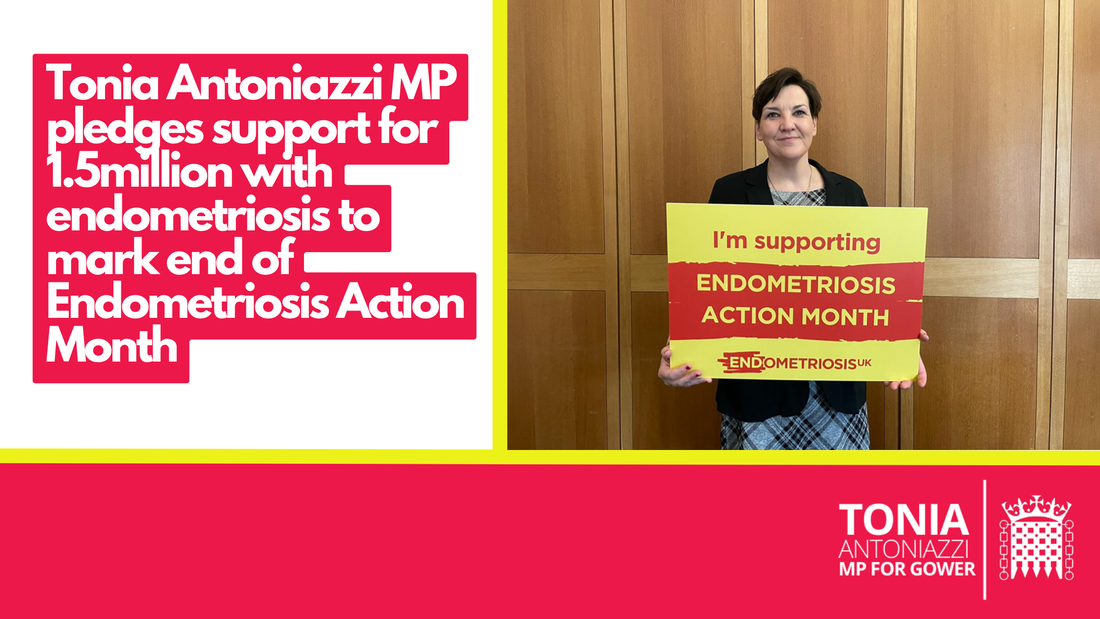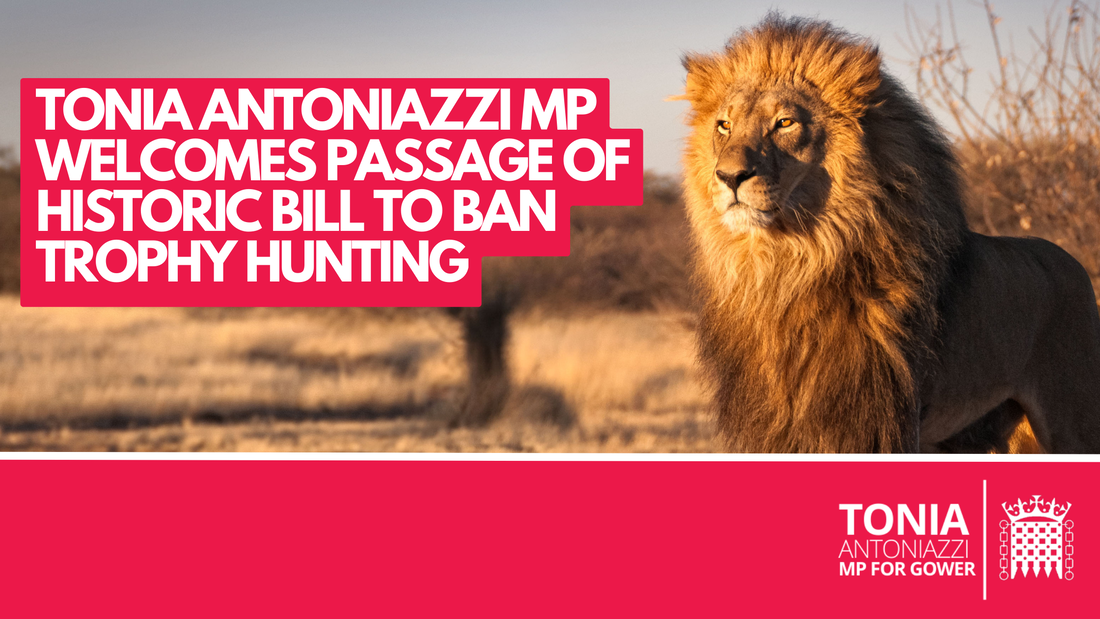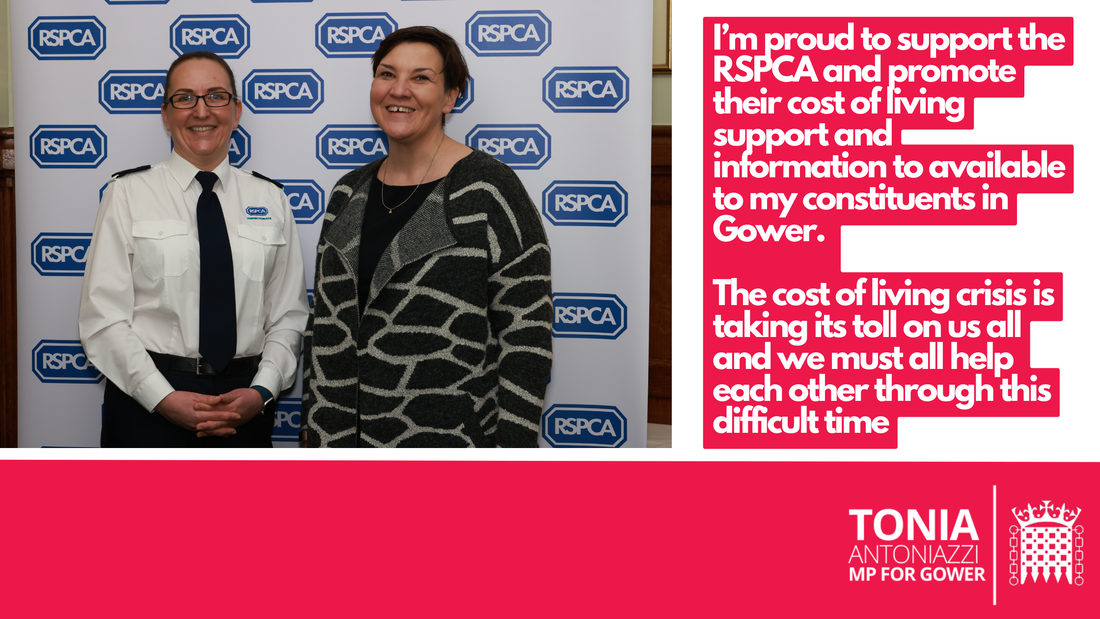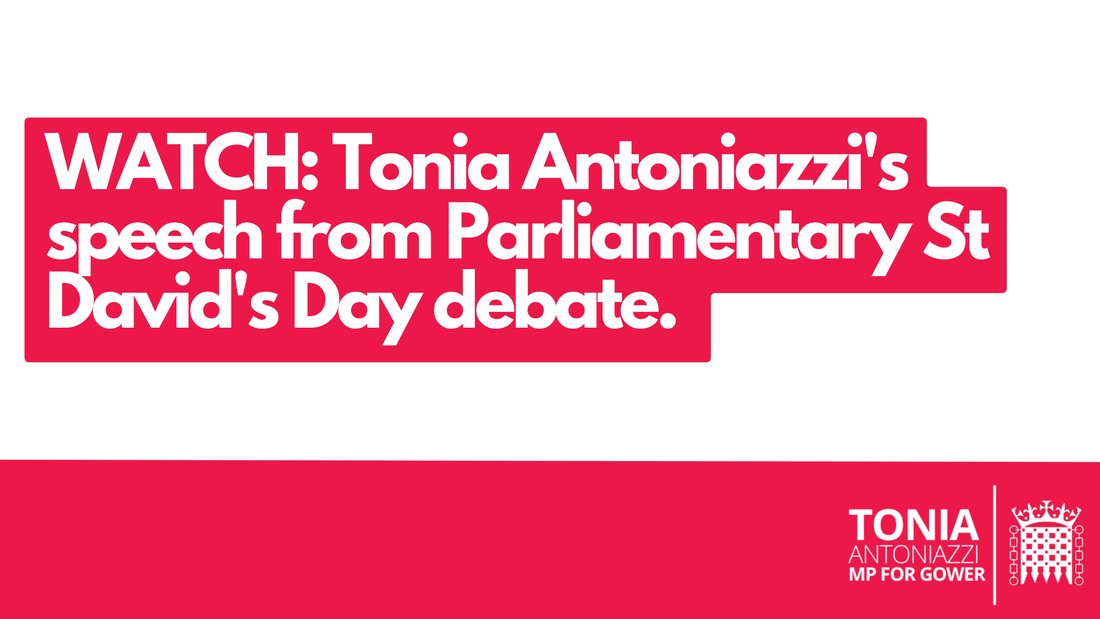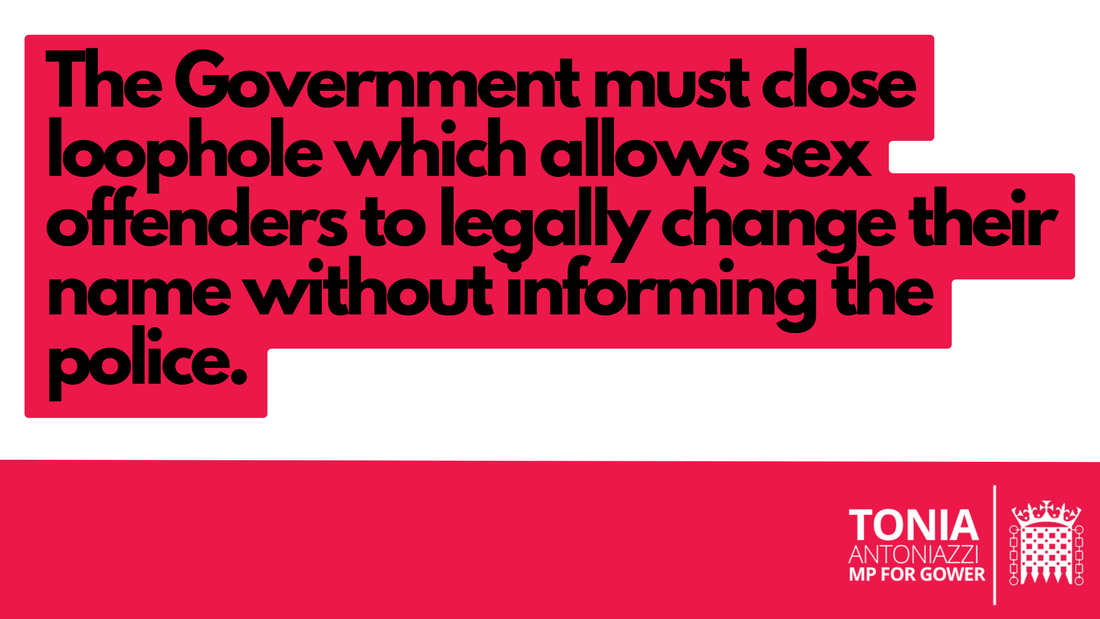|
March is Endometriosis Action Month – a time to raise awareness and drive change for the 1.5million women with endometriosis in the UK.
Tonia Antoniazzi MP has pledged support for the 1.5million living with endometriosis in the UK, as new statistics show that 75% would not go to a doctor with potential endometriosis symptoms. The research also shows that just 49% of the public are aware that endometriosis is a gynaecological health condition – a figure which drops to just 31% of men. Tonia Antoniazzi MP said: “Endometriosis affects 1.5million women in the UK, yet just 49% of the public are aware that endometriosis is a gynaecological health condition – a figure which drops to just 31% of men. Awareness is vital to ensuring everyone recognises the signs and symptoms of endometriosis, and when and how to seek help if they are experiencing symptoms”. The data, from a survey of 2,000 UK respondents conducted by Endometriosis UK, is being released to mark the start of Endometriosis Action Month (March 2023). Among those who said they would put off going to see a doctor in this situation, 24% said it was because they considered painful periods to be a normal part of life, while 23% said they would think it was “not serious enough to bother a doctor with”. Chronic pelvic pain and painful periods that interfere with your everyday life can be symptoms of endometriosis. This common, sometimes debilitating but often-ignored disease affects 1 in 10 women and those assigned female at birth, and can impact all areas of life include mental health, career and relationships. Common symptoms include: · chronic pelvic pain; · painful periods; · pain during or after sex; · painful bowel movements · pain when urinating · fatigue; and · difficulty getting pregnant. Those with one or more of these symptoms may want to keep a pain and symptoms diary to help them in discussion with their doctor to help diagnosis, Endometriosis UK advises. Getting an earlier diagnosis of endometriosis allows access to treatment and management options; without this, the disease may progress. The data also shows that half (51%) of women and those assigned female at birth would feel comfortable talking about periods with their parents or guardians. The figures varied when it came to talk to their spouse (73%), friends (67%), colleagues (33%), medical professionals (72%) or ‘someone I have just met’ (15%) - meaning many feel uncomfortable with such discussions. The symptoms of endometriosis can begin at puberty, and in some cases the impact may last for life, including after the menopause. Faye Farthing, Head of Communications at Endometriosis UK added: “Currently, it takes an average of eight years to get a diagnosis of endometriosis in the UK; without a diagnosis, treatments can't be accessed, and the disease may progress. While the taboo around menstrual health, and a lack of awareness of endometriosis, may contribute to this, it’s also essential that the Government takes action to ensure that healthcare practitioners recognise the symptoms, and that pathways and services are improved. We’re incredibly grateful to [Insert Name] MP for sharing their support during Endometriosis Action Month and pledging support to ensure all those with endometriosis have access to the right care at the right time”. Tonia Antoniazzi MP has welcomed the House of Commons passing the Hunting Trophies (Import Prohibition) Bill, introduced by Crawley MP Henry Smith last year to legislate for a historic ban on trophy hunting imports into this country.
Tonia Antoniazzi MP said; “I’m delighted that the House of Commons has backed the Hunting Trophies (Import Prohibition) Bill. “Our country does not want to be part of a trade in the body parts of endangered species. “This important piece of legislation supports conservation and animal welfare and would ban body part ‘trophies’ of endangered and vulnerable animals from being brought into Great Britain. “I know many Gower residents back the Bill – the House of Commons has been crystal clear in its support.” Henry Smith MP said; “My thanks to Tonia for their support in highlighting the need for a ban on imports of hunting trophies of endangered animals. “The House of Commons passing this legislation marks an important moment in ensuring that this pledge to support conservation becomes a reality. “I’m grateful to the Government for supporting my Hunting Trophies (Import Prohibition) Bill and I look forward to it now progressing through the House of Lords. “On this day, my thoughts are very much with the family and friends of our late colleague, Sir David Amess, who was taken from us far too soon. “Sir David was a tireless campaigner for the banning of trophy hunting imports. I hope that he would have been proud of this legislation being passed by the Commons today.” The Crawley MP and the Government accepted two amendments to the Bill at report stage; including the introduction of an Advisory Board on Hunting Trophies. The Bill will protect animals listed by the internationally agreed Convention on International Trade in Endangered Species (CITES). The legislation would ban British hunters from bringing body part ‘trophies’ of endangered and vulnerable animals into Great Britain. Being approved by MPs at report stage and third reading today marks the conclusion of the Bill’s passage through the Commons, ahead of it being scrutinised further in the House of Lords on a date to be confirmed. This follows the Crawley MP introducing the Bill in the Commons on 15th June 2022, it passing second reading on 25th November, and passing committee stage on 25th January of this year. The International Biodiversity Minister, Trudy Harrison, said; “This is a pivotal moment in delivering one of our key manifesto commitments on international conservation and animal welfare. “Using an internationally agreed list of species, this will play an important part in helping reverse the decline of wildlife across the world. “I look forward to it becoming an Act of Parliament.” Tonia Antoniazzi MP attended an RSPCA cost of living advice event at the House of Commons on Wednesday 8th March, to better understand how to support struggling constituents and their pets.
The RSPCA is working hard to keep pets in loving homes as the cost of living crisis continues to bite. But as the number of abandonments soar, the animal welfare charity has asked MPs to reach out and support local pet owners. Tonia Antoniazzi MP said: “I’m proud to support the RSPCA and I will be doing my bit to ensure that the right help, support and information is available to all of my constituents in Gower. The cost of living crisis is taking its toll on us all and we must all help each other through this difficult time. “It was wonderful to hear about the cost of living assistance the RSPCA is offering - including financial support for many organisations, a dedicated cost of living hub and a new helpline - and I will be sure to relay this to my constituents. “It was devastating to find out that almost 80 percent of RSPCA rescue officers have reported seeing animals suffering as a result of the cost of living crisis. I would urge anyone who is struggling with pet care and the cost of living crisis to use the resources the RSPCA has on offer to get the support they need. Keeping pets in loving homes is a definite priority and I am keen to help signpost to places of support.” Harriet Main, public affairs manager at the RSPCA, added: “We’re really pleased that Tonia attended our drop-in event to find out how she can support her constituents with pet care during the cost of living crisis. Now is a time where compassion and support are needed the most, so it was wonderful to see so many influential and eager to help faces at our event. “The cost of living crisis is the singlest biggest challenge for animal welfare right now and we are sadly seeing an increasing number of abandoned pets. Money worries mean even the most loving owners are concerned about caring for their pets, and in the worst cases are having to make the heartbreaking decision between putting food on the table and keeping their beloved pet. “Recently, we have seen a shocking 25 percent rise in the number of abandonment incidents being dealt with by our rescue teams, and a 13 percent rise in neglect incidents. In addition to this, rehoming is slowing down as people begin to cut back on spending. The number of animals leaving our centres for new homes has fallen by 8 percent. “We are determined to do everything we can to help, but our centres are already full. There are approximately 700 pets waiting to come into our centres right now, and we’re paying huge amounts on private boarding facilities due to these capacity challenges and slower rehoming rates. “However, there is hope and the RSPCA is working tirelessly to provide support and keep pets in loving homes. We’ve committed £1.5million of extra funding to crisis measures; launched a new cost of living hub and a dedicated telephone helpline, while our pet food partnerships right across England and Wales continue to go from strength to strength.” Pet owners can find a range of practical help and advice on the RSPCA’s cost of living hub. The charity has also launched a dedicated phone line for those looking for support (0300 123 0650). To help the RSPCA continue rescuing, rehabilitating and rehoming animals in desperate need of care please visit: www.rspca.org.uk/give. What help can the RSPCA offer? Pet Health Care Costs
Pet Food Bank Partnership ● The RSPCA is collaborating with a range of charities across England & Wales. Use the RSPCA Foodbank map to find a local pet foodbank: https://www.rspca.org.uk/costofliving/foodbank National & Regional
Community Paws Events
Cost of Living Advice Hub
I was honoured to speak in this year's St David's Day debate in Parliament. You can watch my speech in full and read the transcript below. thank my hon. Friend the Member for Swansea East (Carolyn Harris), a good friend, for securing this debate and congratulate her on doing so. It has been a great week; the right hon. Member for Preseli Pembrokeshire (Stephen Crabb) has spoken about the Wales in London events, which have been tremendous. Being at the Guildhall last night with so many people celebrating our Welshness was an honour and I really enjoyed it. It is funny that we are here.
My hon. Friend has spoken about the amazing work she has done with colleagues, and I have had the honour of being able to work with her as well. This gives me the opportunity to talk a little about a charity—this goes hand in hand with the work she has been doing—called The Sharing Table. It was set up a few years ago by Andrew Copson, an amazing man who has given his time to fundraise, with a lot of support from local people, and to make partnerships, particularly with Gower Gin; Andrew and Siân support the charity, as key partners. The Shared Table delivered more than 130 hampers of locally sourced meat and veg to people in Gower last Christmas—when this started it was just 13 hampers in 2019. I thank Hugh Phillips, the butcher, and Shepherds for making that possible, along with Carolyn Harris—sorry, I meant to say, “My hon. Friend”. I do that all the time, Mr Deputy Speaker, as you know, but I do apologise. That charity has also put and is putting small kitchens into schools. We talk about food poverty, but it is important that young people and families learn how to cook and what different food tastes like when we face a health crisis and a cost of living crisis. It is important that children learn what different fruits and vegetables taste like and what to do with them. One of the latest kitchens that has opened is in the constituency of my hon. Friend, in Morriston. I hope that by working alongside Swansea Council the charity will put more kitchens into schools and work with young people and their parents so that they can cook a well-balanced family meal. That is key and that work is amazing. The right hon. Member for Preseli Pembrokeshire mentioned the beautiful city of St Davids in his constituency. I spend many of my holidays there and I do not send him any emails to say that I am there. I was honoured to be there at Christmas to spend time with my family, and being in the cathedral for mass is a wonderful experience. If anybody gets the opportunity to do that at Christmas, it really is something special. I do not wish to leave out the hon. Member for Ceredigion (Ben Lake), my very good friend. As he knows, Aberaeron, has a special place in my heart. My auntie and uncle live there and my godparents used to live there. I am not going to go through everybody and say how wonderful their constituency is, because I must say that the Gower constituency is the most beautiful place to live. I am very proud of everybody who lives there—my constituents, who continue to support me and give generously. My constituents also speak highly of the potential of Swansea bay. I know that the Secretary of State has done a lot of work on what was to be the Swansea bay tidal lagoon, which we now hope will realise itself in the blue lagoon project. The potential of Wales and the green industrial revolution has been mentioned. I do look to him for support for the Labour-led Swansea Council and its leader Rob Stewart in terms of harnessing the tidal energy that we have in Swansea bay. I will have a bit of a rant now, Mr Deputy Speaker. A year ago today, I spoke up in this House about the Welsh Rugby Union. The right hon. Member for Preseli Pembrokeshire told us how he had heard an amazing advocate for women’s football, and football, in Wales last night. There are many, many people who are amazing advocates for rugby in Wales, and I am one of them. I believe passionately that being Welsh also means having a sense of identity. For me, many, many moons ago, that meant being able to represent my country by playing rugby for Wales. I find it really hard to believe that we are too scared—the hon. Member for Ceredigion also made reference to rugby—because we are having a bit of a tough time in Wales. It makes me sad that we cannot big up the talent that we have. I want to big up our talent. We have an amazing captain of our men’s team in Ken Owens. He is an amazing man, one of the bravest. All the team are brave, because the situation in which they find themselves is really difficult for all of them and for their families, but they are not looking for pity. What they want is to make rugby better. I did not stand up in this House a year ago to say, “Isn’t it terrible what’s going on? Isn’t rugby awful in Wales?” It is our job in this place to call out poor practice and poor governance when they impact on how we feel about our sport, which is rugby in Wales. Since I spoke up about the culture of misogyny and sexism a year ago, much has happened. I know that the former Secretary of State met the women’s team. He told me that, by the time he had left the Chamber, he had been invited by the Welsh Rugby Union to pay a visit to the Vale to meet the women’s team. I was really disappointed—not with him, I was glad he went—that, having spoken out, nothing much really happened. It took some very brave women and an amazing journalistic team in “BBC Wales Investigates” to pull together evidence of the poor behaviour in the Welsh Rugby Union. In my inbox, I have more than 30 emails to reply to. They are from women and families—and men—who have written to tell me about their experiences with the Welsh Rugby Union. That is a lot of people who want to tell me about their experiences, but there are also quite a few people who do not want to tell of their experiences to anybody, because they fear the backlash. Charlotte Wathan, who spoke out in the BBC Wales programme, is scared that she will never get a job now. She may have made herself unemployable. She needs to work, but she has spoken out. She has not done that because she wants to be on a 30-minute programme on BBC Wales, and have the focus of everything on her. Another woman who spoke out was anonymous. An actor spoke her words. Why was that? Why did Amanda Blanc, the chief executive of Aviva, step down from the executive board? To be honest, why were those questions not asked? So far what we have seen is the departure of the chief executive of the WRU, which is probably right. But it is not just about one person. This is a cultural system that is impacting not just on women in sport—in this case rugby—but on the men. That is because the culture has also impacted on the wellbeing of our men’s team as well. It is a culture and it is everywhere. I am glad that a taskforce has been set up by Sport Resolutions, funded by the WRU, to address these issues. I ask the Secretary of State to support me—I have told him how many people want to speak out—and to look for reassurances from Sport Resolutions. Will he state today that the anonymity of the people who need to speak to Sport Resolutions and to the taskforce that it is setting up will be kept at all costs? Otherwise, we will never get to the bottom of it, which makes the taskforce absolutely futile. I never thought that after nearly six years in this place, I would be standing in the Chamber ranting about rugby, but it means so much to me and it makes our country proud. Somebody said, “All this talking down of rugby in Wales is not going to encourage young people to play sport,” but that is nonsense. Playing sport—whatever sport it is—getting out there and being part of a team is the best thing that anyone can do. It is brilliant. I am not saying that Wales is a terrible place or that rugby is a terrible sport; it is not. In my heart, I want it to be better—the best it can be. I want Warren Gatland to go to that World cup, with Ken Owens running out as the captain, and do the best he can to show how brilliant it is to be Welsh, so that we can feel proud of those boys and girls on the pitch. The women’s Six Nations is coming up, and the girls had quite a good season last year, so it is an exciting time to be in rugby. Jonathan Davies, or Jiffy as we fondly know him, spoke out on “Scrum V” just after the programme had aired on BBC Wales. He said that this is a moment in time—a turning point—and that if the Welsh Rugby Union and rugby in Wales do not get their act together now, they never will. As parliamentarians, we have to put pressure on the Welsh Rugby Union to make the right decisions and to be transparent. Intervention by Rob Roberts MP The hon. Lady is making a wonderful speech. She is right that the range of subjects that we discuss in the Chamber is often a surprise to the general public, and rugby in Wales is a particularly hot topic. Does she agree, in the spirit of what she has said, that the people who are trying to brush this issue under the carpet need to understand that, in such cases, sunlight is often the best disinfectant? Tonia Antoniazzi MP resumes It is not often that I agree with the hon. Member, but sunlight, transparency and asking those questions are the best things. I find it hard to believe that there have been such a number of grievances and non-disclosure agreements at the Welsh Rugby Union. Let us make no bones about it: all organisations will have grievances and non-disclosure agreements, but it is important that someone sitting on an executive board should be told how many there are and what their nature is, otherwise they might go to a Senedd Select Committee and not be able to tell it how many grievances and non-disclosure agreements there are. I find that difficult, because the data should be held by human resources and available to at least the executive committee. What does it tell us when there are no minutes of meetings and the minutes are not routinely published or available? It tells us that there is no sunlight, which we need to have. When I am told that what has happened at the WRU is bigger than at Yorkshire cricket, and that is confirmed by others who know what is going on, I hope that we will all—I am not precious about it—stand up and ask those questions if we have the opportunity to meet the WRU. We need a root and branch review of rugby in Wales and what it means for everybody in all those clubs across Wales, from a small child starting off in tag rugby to those in our elite male and female games, as well as the mums and dads watching on the sidelines and washing the kit. I have met with my clubs since this has all come out and, interestingly, they have been quite engaging. We all need to ask our rugby clubs—although this is not just about rugby—how they engage with women and girls. They do not have to have a women’s team, because it is not all about playing. It is about being part of a club, being a rugby wife, rugby mum or rugby sister—a fan of the sport. If we can get clubs to audit the skills of the women and girls involved in them, that will encourage them to get more women sitting on their committees. Having more women give up their time to do that is how we will get more parity and equality of representation at the top of the WRU. Intervention from Stephen Crabb MP The hon. Lady is making a remarkable and important speech. She was at the Guildhall last night. Does she remember the remarks of Noel Mooney from the Football Association of Wales about its transition from being dominated by men to something approaching parity between men and women, and how that led to better quality of decisions? An audit of how clubs involve and work with women—the kind of exercise that the hon. Lady talks about—is valuable in its own right, but it will also lead to better decision making because more diverse viewpoints help the decision-making process. Tonia Antoniazzi MP resumes I thank the right hon. Gentleman for his contribution, because he is right that Noel Mooney, the chief exec of the Football Association of Wales, did say last night that the dynamic has changed and that different ideas have been brought to the table, leading to better leadership and management. I have a good friend who lives in Australia. She sits on the board of Rugby Victoria, which has imposed 50:50 representation. She has been ridiculed by other people that she is only on the board because of certain body parts, which is ridiculous. It is actually brilliant, however, because she is not a rugby player, but her daughters are, her son is, and her husband was. That is what I am trying to say. We had all-women shortlists to get better representation in the Labour party. That is the kind of thing we need to do in order to move forward. Clubs need to change their perception of what a woman’s place in rugby is. It is a cultural issue that all sports have problems with. A word that has been said to me is “tokenism”. People say, “It’s just tokenism, Tonia. We don’t buy into it.” I do not buy into tokenism, because this is not about that; it is about being the best we can. However, we did see tokenism, disappointingly, in a knee-jerk reaction from the WRU when it decided to say, “We’re banning Tom Jones’s famous song ‘Delilah’.” I had not heard “Delilah” for donkey’s years, but I went to a rugby match, and everybody in the bar and on the train was singing it, and it was uncomfortable. I am not going to rant on about “Delilah”. It gets sung. We know the words. We all know that the words are wrong, and it would be great if we could change some of them, but hey-ho. The word tokenism strikes at me. At the time of the WRU decision, Louis Rees-Zammit tweeted: “All the things they need to do and they do that first…” It is true; the WRU needs to do better for everybody involved in the sport, be they our little ones playing, the regions—that is a whole other debate—or the elite team. The Secretary of State is well placed to have those conversations, and I know that he has spoken with Nigel Walker, the interim chief executive. I know what a great man Nigel Walker is, and I hope that he and Ieuan Evans can turn this around, but it needs a massive shift. I think I have finished talking about Welsh rugby union and rugby in Wales, but I hope that everybody in this House will join me in saying that we absolutely love rugby and want to big up our players, and that it represents who we are at every single level, whether we have played, watched or just gone along to help out. It is everybody’s; it is ours. On another note—still on rugby, but with a different edge—the people who go to rugby clubs are all volunteers. I know that the Secretary of State met Rachel, one of my constituents, at Lancaster House. Rachel runs Tempo Time Credits, which is a brilliant way of getting people to do more volunteering and of encouraging more diverse groups of people to volunteer and support their local community. Rugby is a sure-fire win to get people involved. Our Tempo Time Credit volunteers can provide support to local rugby clubs, and they then get rewarded, perhaps with tickets to go to the Scarlets or the Blues—they could go to the Ospreys, but I suppose it depends. [Interruption.] Definitely. I do not want to cause a war in the Chamber. I just wanted to give a really big shout out to all those volunteers, because they make sport happen, not just in Wales but across the United Kingdom. For us, that is really important. I will bring my comments to close. I thank everybody who has made this debate happen. I am grateful for the diversity of debate when we talk about Welsh Affairs. I am a very proud Welsh-Italian, and I am proud to have been able to stand up in the Chamber today and speak for those who feel that they do not have a voice. This week I spoke in Parliament to voice my support for a change in the law which would require sex offenders to inform the police and local authorities if they were to change their name by deed poll. The law as it currently stands puts the onus for keeping details on the sex offenders register up to date with the offender, rather than with the police and other authorities. This means a sex offender can now change their name and with little difficulty receive a passport or a driving licence with their new name. At no point are the offenders asked if they have a criminal background before being issued with a legal new identity. This practise must end. You can read the transcript and watch my full contribution below. My huge thanks go to my hon. Friend the Member for Rotherham (Sarah Champion) for bringing this important subject to the Chamber and to national prominence—her role in this has been extraordinary. I also thank women such as Della who have waived their anonymity to expose the serious failures in the DBS system, and to ensure that the law is changed to keep people safe.
As colleagues will no doubt have seen in their constituencies, most people’s reaction to hearing about this loophole is one of utter disbelief—disbelief that simple changes, such as the deed poll asking if the applicant has a criminal record, have not been made; disbelief that a system that so many of them have encountered—anywhere from their children’s school to local sports clubs—features such a fundamental flaw; and disbelief that, despite years of warning from campaigners, the name change loophole still exists and is treated as an administrative headache, not a serious risk. I take this opportunity to highlight a concern that the hon. Member for Telford (Lucy Allan) and the hon. and learned Member for Edinburgh South West (Joanna Cherry) have already mentioned. Good intentions have not been balanced with the risk of leaving another avenue to be exploited and that is so dangerous. The DBS grants enhanced privacy rights to individuals who change their gender when changing their identity. Those are exceptional rights that are granted only to individuals from that group. The result is that identity verification is compromised, meaning that there is no guarantee that the information returned during the check and displayed on the certificate will be accurate or complete. Those exceptional privacy rights also allow an applicant who has changed gender to request that all their previous names are withheld from the DBS certificate that is issued. That right to conceal previous identities is not given to anyone else: disclosing previous identities is a key component of safeguarding, and DBS certificates issued to all other individuals display all other names that the applicant has used. Applicants who change their gender are also permitted to conceal their sex, and the DBS certificate issued will display their acquired gender instead. That right is not granted to any other individual: the importance of sex to safeguarding means that the sex of all other applicants is always displayed. There cannot be any exceptions in safeguarding. For the system to work, it must apply the same standards to everyone. Sadly, it is simply naive to think that loopholes in the system will not be exploited. The system relies on the honesty of sex offenders to ensure that it functions as it should, but as the hon. Member for Mole Valley (Sir Paul Beresford) said, they are not to be trusted; they are not honest. Data obtained by the BBC from police forces highlights just how flawed this approach is. Between 2019 and 2021, more than 5,500 offences were committed by sex offenders of failing to comply with notification requirements: offences such as not telling the police they were living in a household with a child. The Disclosure and Barring Service found that 2,190 applicants for checks had criminal records and had supplied incorrect or missed out personal details such as past names or aliases. A total of 6,740 prosecutions began over the past three financial years for offences by sex offenders of breaches of a sexual harm prevention order or interim order. The system is broken and we must fix it. We have plenty of damning evidence as to why we should. After being released from prison only three years into his six-year sentence for indecent assault, following a string of sexual assault convictions against children, Timothy Cuffy changed his name to Timothy Barnett. His new name allowed him to hide his criminal past, including from his new partner and three children. As Timothy Barnett, he answered the door to 13-year-old Sandy Hadfield, who knocked looking for her friend. After giving her vodka, he lured her to a quiet area of the woods, where he attempted to have sex with her before slitting her throat. Owing to his name change, his background went undetected, even after two encounters with Lincolnshire police and one encounter with social services. A system that means a convicted child sex offender is not identified, despite encounters with the police and social services, is one that is fundamentally broken and that led to the most tragic of outcomes in that case. Sex offenders are not just changing their name post trial to hide their convictions; they are also changing their name at trial, or just before, to protect their name on their birth certificate. That has been highlighted in the high-profile case of Department for International Development worker Peter Davis, who became James Robert Harris before trial, allowing him to keep all records of his birth name clean should he decide to use it again. This loophole gives sex offenders and abusers, many of whom rely on their ability to manipulate in order to carry out their crimes, an opportunity to hide their criminal history and pass the very checks that are meant to keep the most vulnerable safe. This loophole renders not only the DBS redundant but the domestic violence disclosure scheme, the sex offenders register and the child sex offender disclosure scheme. It seems absurd that we are discussing this 20 years on from the Bichard inquiry, which identified that the ability of serial predator Ian Huntley to change his name by deed poll to Ian Nixon, successfully severing the link with his existing police records, meant that no alarms were raised, and he was employed as a school caretaker. That this loophole still exists, allowing—indeed, enabling—serial predators to create new identities, is a scandal. We are in this place to be legislators. We are in this place to make decisions and to ask the questions, “What if?” and “How?” We have to safeguard the most vulnerable people in society from these bad actors in all legislation. I pay tribute to everybody in the Gallery today and my hon. Friend the Member for Rotherham for her outstanding work on this issue. |
News Archive
May 2024
Categories
All
|
